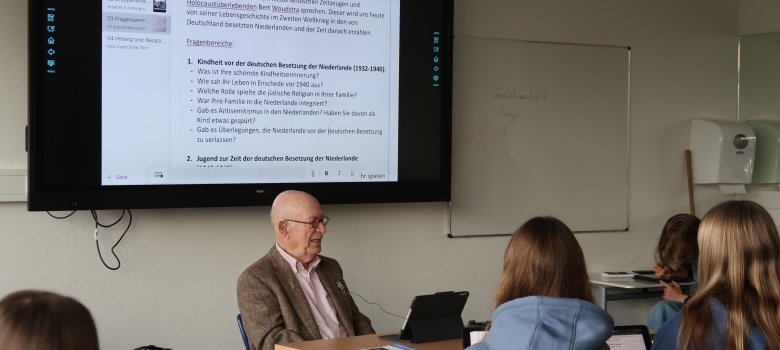Knowing the facts and figures of Germany's National Socialist past is one thing, and of course a daily task for many history teachers in the country. Making this period comprehensible to pupils, filling history with life, people and faces, is a completely different and even more important challenge, because only this knowledge helps them to draw conclusions from history for their own actions in the present and future.
As part of the annual "School without Racism" project days, a workshop from the ninth year of the Werner-von-Siemens-Gymnasium, led by history teachers Jens Lücke and Ines Springer, therefore dealt with the National Socialist crimes committed on their own doorstep in Gronau, Epe and the neighboring Netherlands.
A special encounter was on the agenda for the workshop participants on Tuesday: Bert Woudstra, born in Enschede in 1932, who as a Jew had to experience the horrors of National Socialism in the Dutch underground and was able to survive, was a guest in the classroom and was available to the pupils for a very personal and lively discussion for over two hours. The topics covered in the list of questions prepared by the pupils in advance ranged from Woudstra's carefree childhood before the Second World War to his current view of the state of the world.
For the then eight-year-old, the year 1940, when National Socialist Germany occupied the Netherlands and also pursued its inhumane policy of exclusion, persecution and ultimately murder of European Jews there, marked the beginning of a five-year odyssey in hiding, which he described in impressive detail. He went into hiding in a total of 12 different hiding places until 1945, separated from his mother, with only a book and a teddy bear in his luggage, often in fear of death, several times on the verge of being betrayed or discovered. He logically described the liberation in April 1945 as the happiest moment of his life, which was quickly overshadowed by the sudden realization of the many murdered relatives in the cruel extermination machinery of Auschwitz and other concentration and extermination camps. In the face of this horror, the young people and teachers were particularly impressed by the very cheerful and positive attitude of the almost 92-year-old. "Every morning I look at myself and say: 'You're still here'. That's great luck," he commented on a pupil's question about how he deals with the past. With a smile, he complied with the workshop participants' request to record the interview and preserve it as a podcast, because "we contemporary witnesses are slowly dying out." Preserving history, e.g. through this podcast project, was particularly important to him, he said, precisely because he was concerned about developments in the world. However, he ended on a hopeful note with an appeal to young people: "99% of people are good. Keep the good in you too." (Spr)

